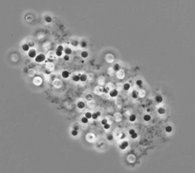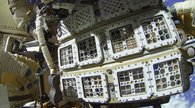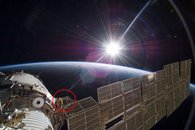Methanosarcina soligelidi under simulated Martian conditions in space: survival and biosignatures
Funding: Federal Ministry for Economic Affairs and Energy
Status: current
Cooperations:
Dr. Jean-Pierre de Vera, German Aerospace Center, Berlin
Dr. Kai Mangelsdorf, Helmholtz Centre Potsdam German Research Centre For Geosciences
Dr. Andrea Vieth-Hillebrand, Helmholtz Centre Potsdam German Research Centre For Geosciences
Dr. Elke Rabbow, German Aerospace Centre, Cologne



The project (as a partial experiment of the BIOMEX proposal, ILSRA-2009-0834) investigates the viability of the model organism Methanosarcina soligelidi SMA-21 isolated from Siberian permafrost under simulated Mars conditions on Earth and in space (ISS). For the first time, the stability of cell components of methanogenic archaea is characterized and a qualitative and quantitative analysis of degradation residues of methanogenic cells after exposure under space conditions is performed. The latter is used to create an international database for biosignatures, which is located at the German Aerospace Centre (DLR) in Berlin.
The methodological approach applied within the project includes both microbiological and molecular biological analysis of the exposed cells of the strain Methanosarcina soligelidi SMA-21. The survival rate (live/dead-staining, qPCR) and the activity (CH4 measurement) of the organisms returned from the ISS will be analyzed after the exposure experiment. In addition, electron microscopy and Raman spectroscopy are used to analyze cell structures and to study biosignatures on Mars analog minerals. Furthermore, phospholipid analyzes of the cell membranes are carried out, which serve to identify possible biosignatures. In addition to the samples from the ISS, comparative samples of the "mission ground reference experiment", which was carried out at the DLR in Cologne, are analyzed with the appropriate methods.


